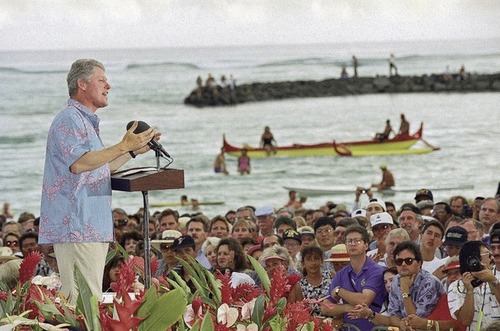It has been 20 years since Congress apologized on behalf of the United States for the 1893 overthrow of the Hawaii kingdom, but some Native Hawaiian activists are still waiting for the reconciliation promised along with the conciliatory words.
The so-called "apology resolution" has been considered a significant milestone for Native Hawaiians in seeking redress and reconciliation with the federal government. It was passed to acknowledge the 100th anniversary of what the resolution described as the "illegal overthrow" of the Hawaiian government.
"It was important because it was a national admission by the U.S. government that the Hawaiian islands were improperly assumed by the United States," Leon Siu, an activist for the Hawaiian independence movement, said this week.
The apology resolution was passed by Congress and signed by President Bill Clinton Nov. 23, 1993, 20 years ago today. The resolution expressed "deep regret" to Native Hawaiians for the overthrow that included the participation of U.S. agents and citizens and U.S. naval forces invading the Hawaii nation. Specifically, it said Congress:
» "expresses its commitment to acknowledge the ramifications of the overthrow of the Kingdom of Hawaii, in order to provide a proper foundation for reconciliation between the United States and the Native Hawaiian people; and
» "urges the President of the United States to also acknowledge the ramifications of the overthrow of the Kingdom of Hawaii and to support reconciliation efforts between the United States and the Native Hawaiian people."
"The U.S. apology basically said, ‘Sorry for stealing your nation,’ but the apology purposely avoided providing any remedy, and the U.S. for the past 20 years has refused to engage in any meaningful dialogue for reconciliation," Hawaiian independence activist Pilipo Souza said this week.
While some critics say the resolution didn’t go far enough in providing redress to Native Hawaiians, others have disputed the historical narrative in the resolution and maintain that an apology isn’t necessary.
Still, the state Legislature recently reflected its support for the congressional action by passing its own resolution in April commemorating the 20th anniversary. State lawmakers said they reaffirm the state’s commitment to reconciliation with Native Hawaiians for "historical injustices." The resolution also urges the federal government to advance reconciliation efforts.
The U.S. resolution was endorsed by all four Democratic members of Hawaii’s congressional delegation — U.S. Sens. Daniel Inouye and Daniel Akaka and U.S. Reps. Patsy Mink and Neil Abercrombie.
The apology was cited by the Hawaii Supreme Court in its 2008 ruling upholding a moratorium preventing the state from selling ceded lands that once belonged to the Hawaiian kingdom. But the U.S. Supreme Court overturned the decision in 2009, saying the resolution did not take away the state’s sovereign authority to sell the lands.
And it has been highlighted in the congressional campaign to support the Akaka Bill that seeks to set up a process for Native Hawaiians to negotiate with the federal government on land and cultural issues. But the bill has been stalled by Senate Republicans for more than a decade, and supporters this year called on President Barack Obama to investigate the possibility of administratively awarding federal recognition to Native Hawaiians, effectively bypassing Congress.
This is not the solution Siu and other independence activists seek.
"Instead of returning our country, the U.S. is trying to further subdue the Hawaiian people by offering to turn ‘Native Hawaiians’ into a ‘federally recognized’ Native American Indian tribe. This is not reconciliation; this is humiliation." Siu said.
In its testimony in support of the state Legislature’s resolution, the Office of Hawaiian Affairs said in the past 20 years, "new issues and debates have arisen regarding the proper means to address the ongoing historical harms and challenges faced by Native Hawaiians in restoring and maintaining their culture, cultural values and self determination."
OHA officials pointed out that the apology resolution was "a rare act of self-criticism" expressing a "clear commitment" to reconciliation with Native Hawaiians.
But, they noted, "lasting reconciliation continues to be a long and uncertain one."
——
ON THE NET
» The apology resolution can be found at: 1.usa.gov/1aWBilK

